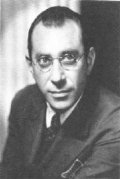Skip to: site menu | section menu | main content
Welcome To Democracy And Socialism .Com
Things should be made as simple as possible, but not any simpler- Albert Einstein
Herbert Joseph Biberman (1900-1971) |
 |
Herbert J. Biberman was a progressive American director, producer, and screenwriter who was blacklisted during the anti-communist hysteria of McCarthyism. He was one of the so-called Hollywood Ten who had to appear before the House of Un-American Activities Committee on the 29th of October 1947. Biberman and his colleagues declined to answer any questions and maintained that the 1st Amendment of the US Constitution gave them the right to do this. The HUAC and the appeal courts, all disagreed. The Hollywood Ten were found guilty of contempt of Congress. Biberman was sentenced to six months in Texarkana Federal Correctional Institution and fined $ 1,000.
Biberman’s nine colleagues were, Albert Maltz, Adrian Scott, Alvah Bessie, Dalton Trumbo, Edward Dmytryk, John Howard Lawson, Lester Cole, Ring Lardner Jr. and Samuel Ornitz.
While the mafia was infiltrating the police, the judiciary and other branches of the government, J. Edgar Hoover, the first Director of FBI not only refused to acknowledge the existence of organized crime, but sadistically hunted the vast majority of brilliant intellectual minds of the society, among them those working in the film industry.
The repressive triangle of the HUAC, the Subversive Activities Control Board (SACB) of Senator McCarthy, and the FBI blacklisted hundreds of directors, producers, writers, and actors inside and outside of Hollywood.
What overt Fascism committed against the Soviet Union and the progressive forces in Europe, covert Fascism did the same against intellectuals and worker’s advocates in the United States of America.
It is interesting to mention that the mafia with collaboration of the CIA had photographed the nasty sex life of J. Edgar Hoover and blackmailed him to divert FBI’s mission of persecuting gangsters and criminals to hunting communists and progressive forces (watch the related video).
During his 48 years as the Director of the Bureau of Investigation (1924-1935), and the Director of FBI (1935-1972), Edgar Hoover became more powerful than any president he served. He used his information about people to neutralize and silence them. Conspiracy and mishandling of information to gain political and economic interest have become common practice since then.
Mysterious assassinations of President Kennedy (1963), Malcolm X (1965), Martin Luther King (1968), Robert Kennedy (1968), and the suspicious death of Marilyn Monroe (1962) took place during the last decade of Hoover’s rule, and still are not solved.
Back to the Biberman’s story: he was born on March 4th, in Philadelphia, Pennsylvania. His parents Joseph and Eva Biberman were Russian immigrants. His younger brother Edward was a modernist painter, whom was also blacklisted.
Biberman studied at the University of Pennsylvania. In 1928, he joined the Theatre Guild as an assistant stage manager and the year after directed the Soviet play, Red Rust, Roar China, Green Grow the Lilacs, and the Miracle at Verdun.
In 1930, Biberman married actress Gale Sondergaard, who got also blacklisted for supporting her husband. They had two children together.
In 1954 and after his release from prison, Biberman continued his work independently by directing the famous film, Salt of the Earth, in New Mexico. This film was produced by Paul Jarrico and written by Michael Wilson; who were all blacklisted.
Biberman and his wife sold their home in Hollywood and moved to New York City, where they were able to work in theatre and occasionally on TV series.
Biberman has never been formally removed from the old blacklist. He died on June 30th of bone cancer.
Most famous films:
One Way Ticket, 1935 (Director)
Meet Nero Wolf, 1936 (Director)
King of Chinatown, 1939 (Writer)
When Tomorrow Comes, 1939 (Writer)
Action in Arabia, 1944 (Writer)
The Master Race, 1944 (Writer, Director)
Together Again, 1944 (Writer)
Abilene Town, 1946 (associate producer)
New Orleans, 1947 (Writer, associate producer)
The Hollywood Ten, 1950 (Himself, documentary short)
Slaves, 1969 (Writer, Director)
was adapted from famous novel, Uncle Tom’s Cabin by Harriet Beecher Stowe.